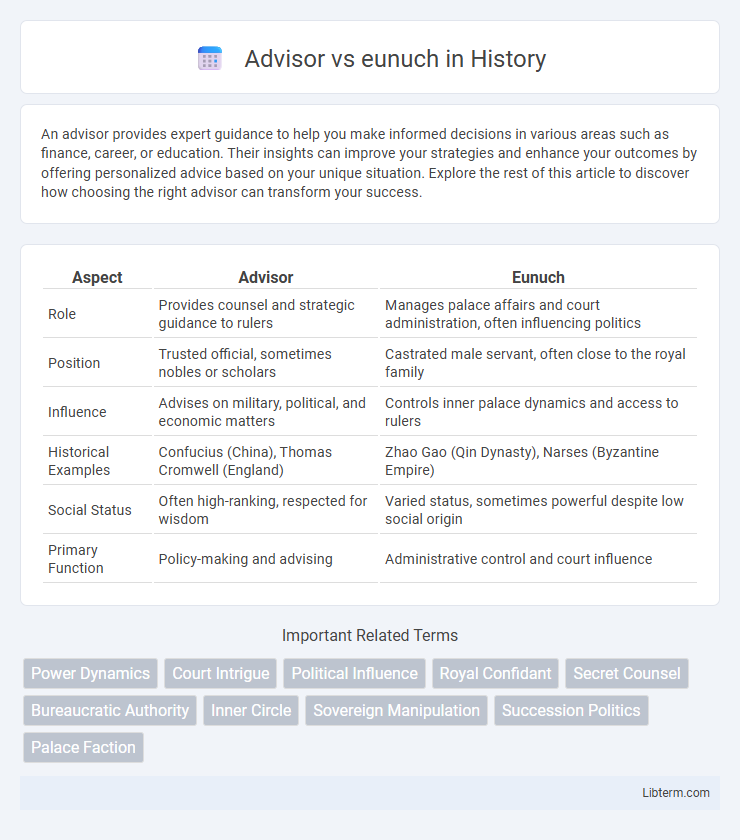An advisor provides expert guidance to help you make informed decisions in various areas such as finance, career, or education. Their insights can improve your strategies and enhance your outcomes by offering personalized advice based on your unique situation. Explore the rest of this article to discover how choosing the right advisor can transform your success.
Table of Comparison
| Aspect | Advisor | Eunuch |
|---|---|---|
| Role | Provides counsel and strategic guidance to rulers | Manages palace affairs and court administration, often influencing politics |
| Position | Trusted official, sometimes nobles or scholars | Castrated male servant, often close to the royal family |
| Influence | Advises on military, political, and economic matters | Controls inner palace dynamics and access to rulers |
| Historical Examples | Confucius (China), Thomas Cromwell (England) | Zhao Gao (Qin Dynasty), Narses (Byzantine Empire) |
| Social Status | Often high-ranking, respected for wisdom | Varied status, sometimes powerful despite low social origin |
| Primary Function | Policy-making and advising | Administrative control and court influence |
Introduction: Advisor vs Eunuch Defined
Advisors are trusted officials who provide strategic counsel to rulers, influencing political and administrative decisions through expertise and diplomacy. Eunuchs, historically castrated males serving in royal courts, held unique positions of power due to their intimate access and perceived loyalty, often acting as intermediaries or guardians of the palace. The distinction lies in advisors' roles as external consultants versus eunuchs' embedded, often personal, involvement within the sovereign's inner circle.
Historical Context of Advisors and Eunuchs
Advisors and eunuchs played crucial roles in shaping political power dynamics throughout history, especially in ancient Chinese and Middle Eastern courts. Advisors typically wielded influence through intellectual and strategic counsel to rulers, while eunuchs, often castrated males, gained power by serving intimately within royal households, acting as gatekeepers and intermediaries. The unique status of eunuchs allowed them to accumulate political and administrative control, contrasting with advisors whose authority depended largely on their expertise and loyalty.
Roles and Responsibilities: A Comparative Overview
Advisors serve as strategic consultants, providing critical insights and guidance on political, economic, and military matters to rulers or executives, while eunuchs often held roles as court officials or palace guardians with limited political influence but significant control over internal palace affairs. Advisors are tasked with policy formulation, diplomatic negotiations, and decision-making support, contrasting with eunuchs who typically managed palace logistics, maintained security, and ensured the ruler's privacy. The distinct responsibilities highlight advisors' external governance focus versus eunuchs' internal administrative and protective functions within royal courts.
Influence on Rulers and Policy Decisions
Advisors wield significant influence over rulers by offering strategic counsel, shaping policy decisions through expertise and trusted relationships. Eunuchs, often occupying close personal roles within royal courts, exert power by controlling access to the ruler and managing palace affairs, indirectly affecting governance and decision-making processes. Both roles create unique channels of influence, with advisors impacting policies through intellectual input, while eunuchs influence through proximity and gatekeeping in the ruler's inner circle.
Power Dynamics at Court
Advisors often held influential roles as key intermediaries between monarchs and administrative officials, leveraging their knowledge and counsel to shape policy and decisions at court. Eunuchs, frequently entrusted with intimate access to royal quarters, exercised soft power by controlling information flow and managing palace intrigues, thus influencing the ruler's perceptions and alliances. The power dynamics between advisors and eunuchs hinged on their distinct access points to authority--advisors through formal counsel and eunuchs through personal proximity--resulting in a complex balance of political leverage within the court.
Loyalty and Motivations Analyzed
Advisors often demonstrate loyalty driven by political strategy and personal ambition, aligning their motivations with the ruler's success to maintain influence and power. Eunuchs' loyalty tends to be more personal and protective, rooted in their unique social position and dependence on the ruler for status and security. Understanding these differing motivations reveals how loyalty dynamics shape court politics and decision-making processes.
Cultural Perceptions and Stereotypes
Advisors are often perceived as wise and influential figures who provide strategic guidance, embodying intellect and trustworthiness in many cultures. Eunuchs historically face stereotypes tied to their unique social roles, frequently depicted as loyal yet marginalized individuals within royal courts. These contrasting cultural perceptions highlight broader societal attitudes toward power, gender, and social hierarchy.
Famous Advisors and Notable Eunuchs
Famous advisors like Niccolo Machiavelli and Sun Tzu played crucial roles in shaping political strategies and statecraft, often advising monarchs and generals with wisdom that influenced history. Notable eunuchs such as Zheng He and Narses held significant power in imperial courts, managing military expeditions and administrative affairs despite their unique social status. Both advisors and eunuchs served as indispensable agents in governance, wielding influence through counsel or control behind the throne.
Impact on Governance and Legacy
Advisors historically shaped governance by providing strategic counsel that influenced political decisions, fostering stability and reform, while eunuchs often held unique administrative roles that centralized authority but sometimes bred corruption or weakened institutional structures. The legacy of advisors is marked by enhanced statecraft and enduring policies, whereas eunuchs' impact is characterized by fluctuating power dynamics that could both safeguard and destabilize regimes. Effective governance depended on balancing the influence of both, with advisors promoting long-term vision and eunuchs executing immediate administrative control.
Modern Echoes: Lessons from History
The historical roles of advisors and eunuchs reveal enduring lessons for modern leadership and governance structures. Advisors wield influence through strategic counsel and policy shaping, while eunuchs historically maintained power via proximity to rulers without familial ties, reducing conflicts of interest. Contemporary organizational dynamics reflect these paradigms by balancing expert guidance with loyalty and impartiality to prevent power consolidation and ensure ethical governance.
Advisor Infographic

 libterm.com
libterm.com